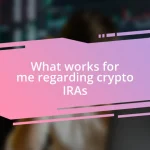Key takeaways:
- Stricter regulations, such as KYC and tax reporting changes, enhance market safety but require traders to adapt their strategies proactively.
- Utilizing tools like compliance checklists, risk assessment frameworks, and regulatory databases simplifies navigation through complex legal requirements.
- Community engagement, through online forums and local meet-ups, fosters shared knowledge and support, ensuring traders remain informed and empowered in a constantly evolving environment.
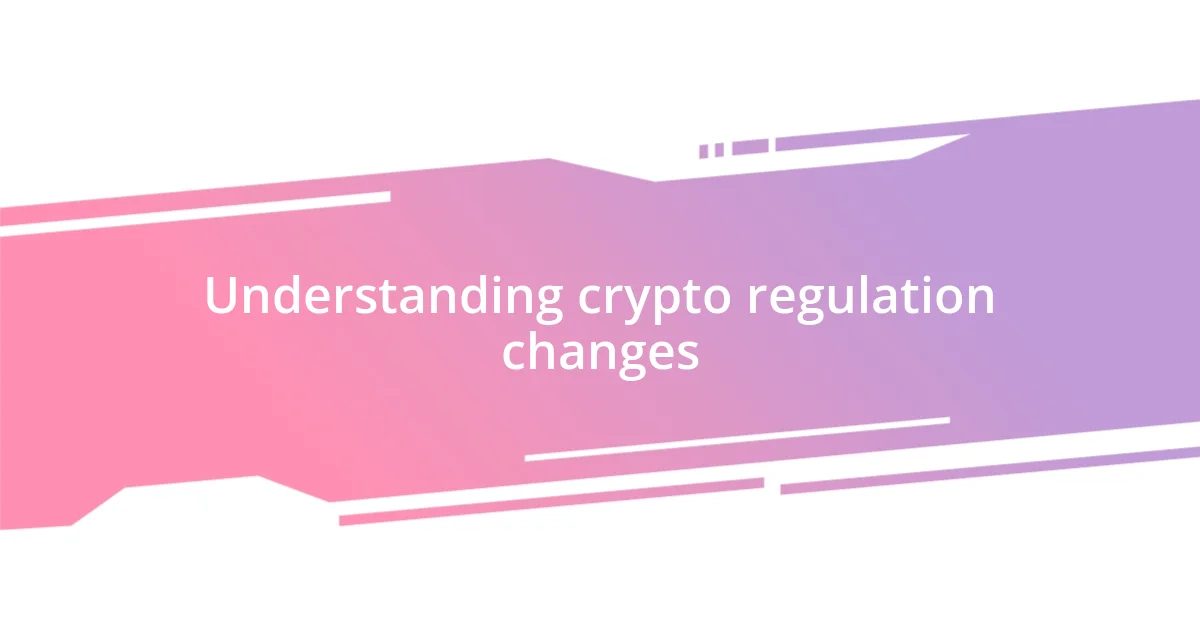
Understanding crypto regulation changes
Navigating the ever-evolving landscape of crypto regulations can feel like being tossed around in a storm. I remember when new regulations hit the news, and I felt a wave of anxiety washing over me—what would this mean for my investments? It’s a mix of excitement and uncertainty, isn’t it? Each change can ripple through the entire market, affecting everything from trading strategies to the very foundations of trust within the community.
One regulation that stands out in my memory was the introduction of stricter KYC (Know Your Customer) policies. Initially, I found it frustrating to share more personal information just to trade. But then I realized that these regulations can foster a safer environment. It’s like having bumps on the road; they might slow us down, but they also create a smoother, more trustworthy path in the long run.
I sometimes ponder, how can we adapt our strategies to stay ahead in such a dynamic environment? By closely monitoring regulatory developments and aligning them with our investment goals, we can turn potential obstacles into opportunities. I’ve learned to embrace these changes as a necessary part of our journey in the crypto universe, transforming anxiety into proactive adaptation.
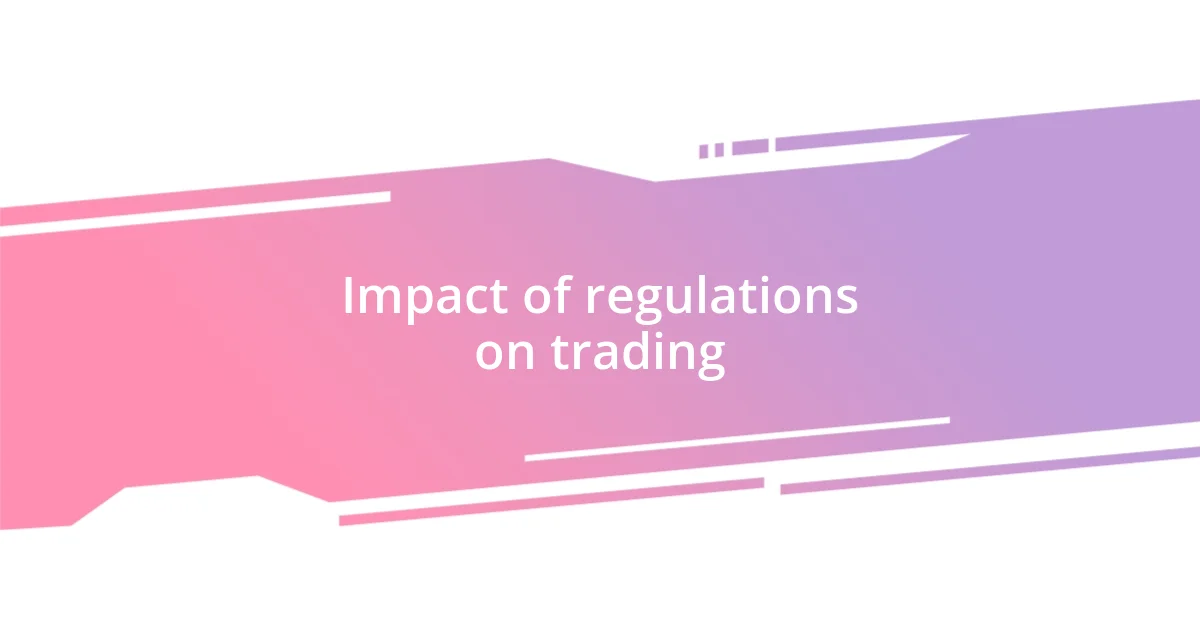
Impact of regulations on trading
Regulations have a profound impact on trading dynamics within the crypto space. When I first faced announcements about new compliance measures, it felt like a sudden roadblock. I remember one specific instance when a sudden change in tax reporting rules came out. I had to scramble to reevaluate my trades, fearing hefty penalties for non-compliance. Yet, the silver lining was that such regulations encouraged a more disciplined approach to my trading strategies.
Here are some key impacts I’ve noticed from regulatory changes:
– Increased transparency can build trust between traders and platforms, making the overall trading experience smoother.
– Stricter trading regulations can lead to reduced market volatility in the long term, but they can also create short-term turbulence as traders react.
– The need for compliance might limit some trading options, pushing some to seek out decentralized platforms or alternative assets.
These shifts have taught me to stay adaptable and informed, turning potential frustrations into a more strategic trading mindset.
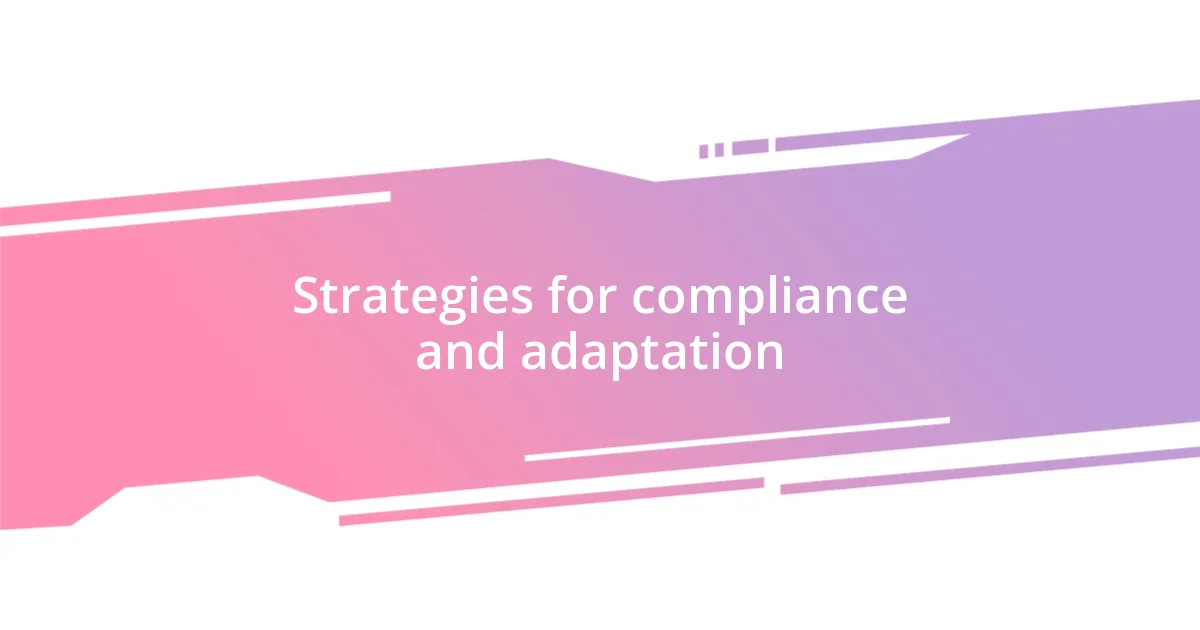
Strategies for compliance and adaptation
Adapting to the shifting regulatory landscape in crypto isn’t just about keeping up; it’s about staying proactive. I recall a period when I had to double-down on educational resources to fully grasp the implications of new compliance measures. I subscribed to several newsletters and joined online forums. This helped me not only to keep informed but also to connect with others facing similar challenges. I’ve found that sharing experiences and strategies opens up a world of insights that can refine my approach to trading and compliance.
One of the most practical strategies I’ve implemented is creating a compliance checklist tailored to my trading activities. This simple tool has been a game-changer for me. Each time I encounter a new regulation, I assess how it impacts me and update my checklist accordingly. For instance, when I first had to navigate the challenges of reporting crypto gains, having a structured plan allowed me to stay organized and confident. It’s like having a personalized roadmap—no turns are missed, and I can focus on my overall journey.
I believe collaborating with experts and peers can drive compliance efforts even further. Attending workshops and webinars has led me to valuable discussions that deepen my understanding of complex regulations. Recently, I joined a roundtable with industry experts, which enriched my perspective on compliance. It reminded me of the importance of not just adapting individually, but fostering a community that learns together. Have you considered how networking could enhance your understanding of regulatory changes? I assure you; it can create pathways to innovative solutions that benefit everyone.
| Strategy | Description |
|---|---|
| Educational Engagement | Stay informed through newsletters, forums, and discussions to understand the latest regulations. |
| Compliance Checklist | Create and tailor a checklist that reflects your trading activities and regulatory requirements. |
| Networking | Participate in workshops and connect with experts to share insights and strategies. |
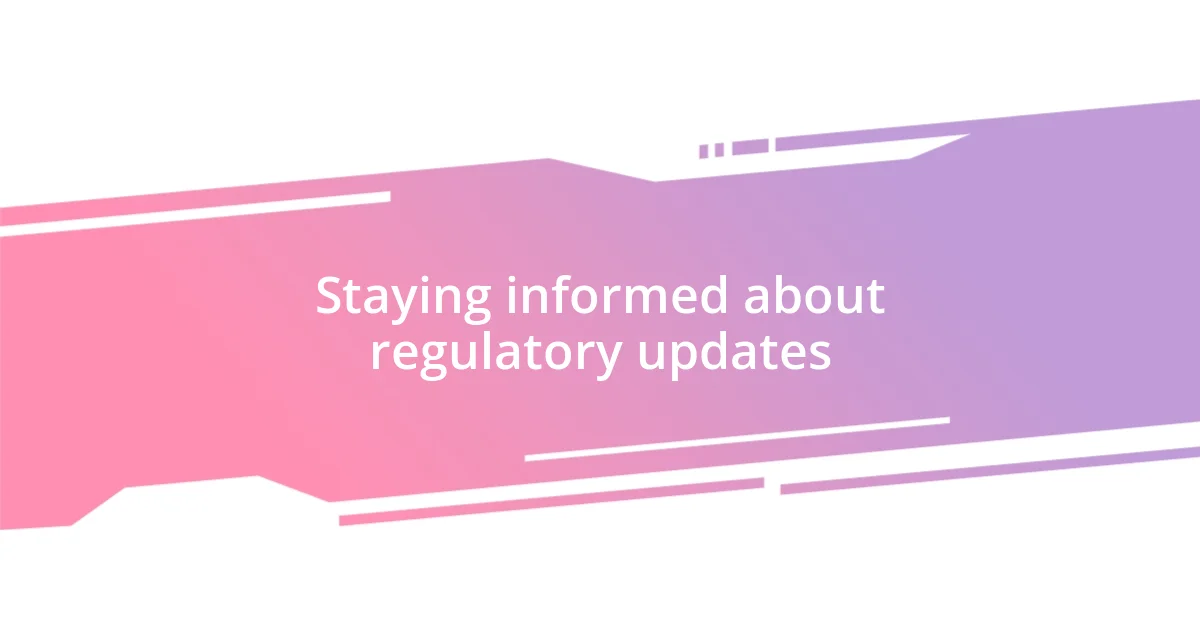
Staying informed about regulatory updates
Staying on top of regulatory updates in the crypto space is crucial. I remember the first time I discovered a key change in international regulations through a late-night social media scroll. It was alarming! I felt a mix of anxiety and determination—I knew I had to be vigilant. Since then, I’ve made it a routine to set aside a few minutes each day for reading the latest news and updates. It’s like a daily vitamin for my trading strategy; it keeps me healthy and prepared.
One tool that has dramatically improved my ability to stay informed is using alerts. I signed up for notifications from reputable sources, including government updates and well-established crypto news platforms. When I receive an alert about a significant change, I feel a rush of responsibility—my heart races as I realize the potential implications for my trades. I often think, “How will this shift my strategies?” This immediacy encourages me to research further and digest the information actively.
I can’t stress enough the value of engaging in communities focused on crypto regulations. Recently, I attended a local meet-up where we discussed new tax legislation affecting our trades. This exchange of ideas was eye-opening and enriching. It made me realize, how many others might be grappling with the same issues? By sharing experiences and insights, we foster a collective understanding that prepares us for the unexpected. Wouldn’t you agree that sharing knowledge can transform anxiety into empowerment?
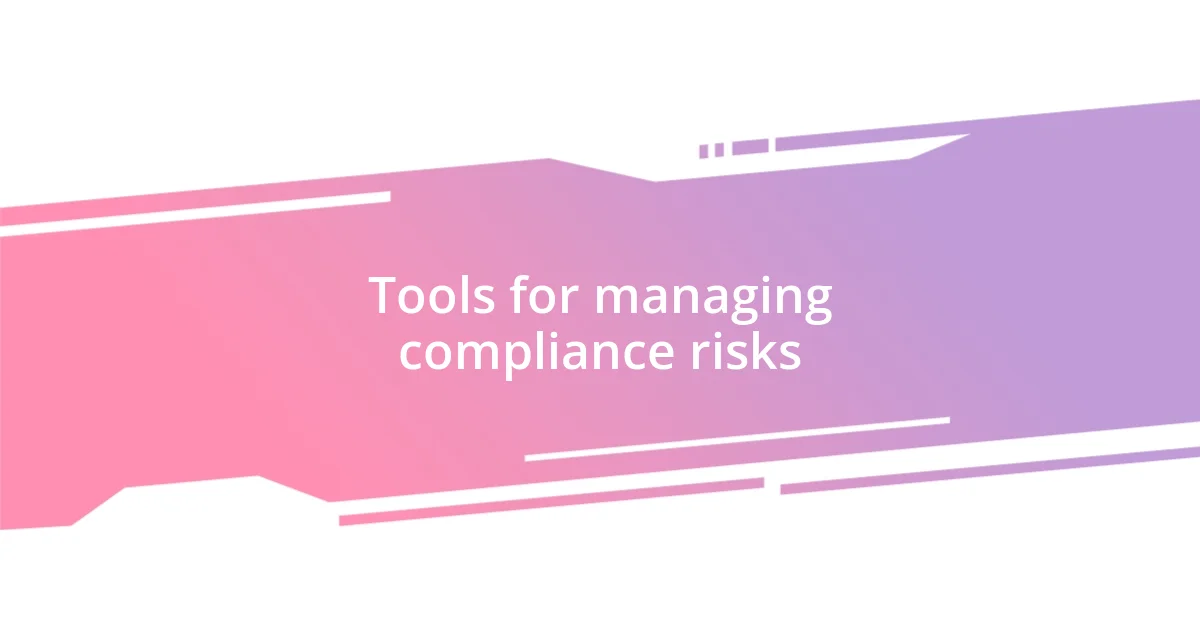
Tools for managing compliance risks
When I look at the variety of tools for managing compliance risks, I can’t help but emphasize the importance of software solutions. Early on in my crypto journey, I adopted compliance tracking software that automatically updates me on regulatory changes relevant to my trades. I remember the sense of relief I felt when I realized I didn’t have to comb through endless articles each day; the software consolidated everything in one dashboard. It was like having a personal assistant dedicated to compliance, and it freed up my time to focus on what I truly love—trading.
Another crucial tool that I often rely on is risk assessment frameworks. Developing a simple matrix to evaluate compliance risks associated with my investments has proven invaluable. By assigning a risk level to each trade based on the regulatory landscape, I can prioritize my focus. I once faced a situation where a sudden rule change caught me off-guard; thankfully, my risk matrix had categorized that investment as high-risk, prompting me to reassess my position immediately. Have you ever wished you had a tool that could alert you to potential pitfalls before they become critical? This very tool saved me from a costly blunder.
Lastly, I’ve found immense value in regulatory databases that compile laws and guidelines in one place. I subscribe to an online service that offers a detailed breakdown of regulations by jurisdiction. The first time I utilized it for a transaction cross-border, I felt equipped and confident, which is such a rare feeling in a constantly shifting environment. It’s like having a cheat sheet for navigating complex rules—do you ever wish you had someone simplifying the maze of legal jargon for you? This tool has transformed my compliance approach, and I genuinely encourage others to explore similar resources for their own peace of mind.
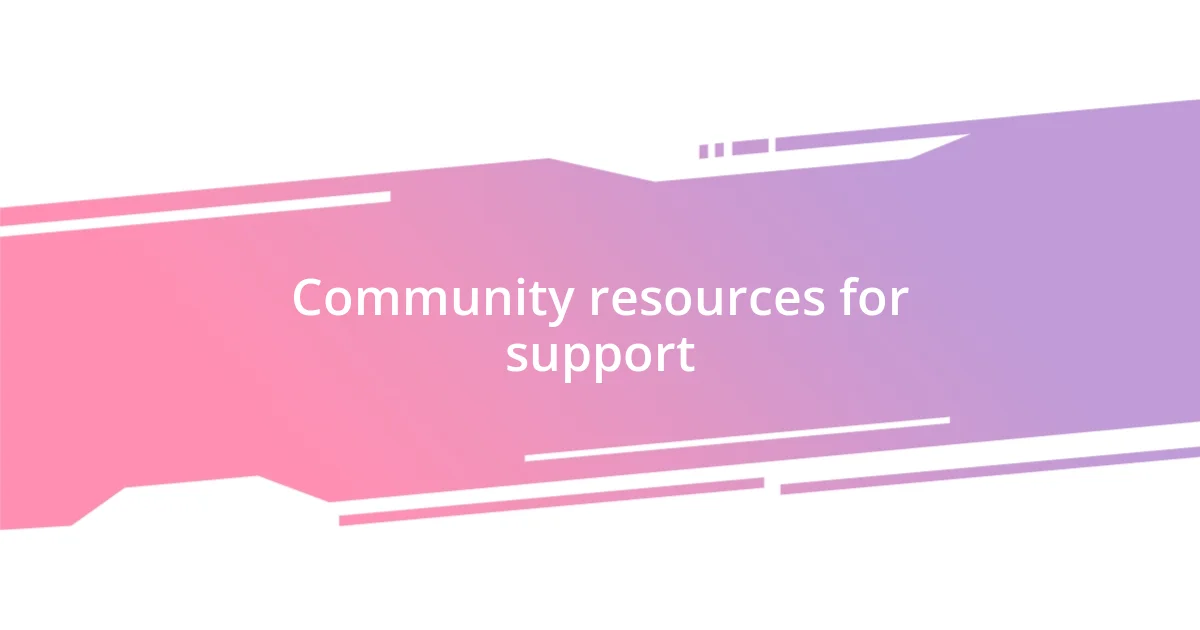
Community resources for support
Finding community resources for support in the ever-evolving crypto landscape has been a game-changer for me. I still remember the first online forum I joined, where seasoned traders shared their experiences navigating new regulations. Connecting with others who faced similar challenges made me feel less isolated; it was comforting to know I wasn’t alone in this complexity. Don’t you think it’s invigorating to exchange thoughts with those who truly understand your predicament?
Then there are local crypto groups and meet-ups that have enriched my understanding tremendously. In one of these gatherings, I met a fellow trader who introduced me to online platforms focused on regulatory compliance. This conversation opened doors for me—a simple exchange turned into a treasure trove of information. Have you ever left a meeting feeling empowered, as if you’re now armed with resources to tackle whatever comes next? That’s exactly how I felt!
Online platforms and social media groups can also be invaluable resources. I’ve developed a habit of following certain Twitter accounts and Reddit threads that focus solely on regulatory updates. The real-time feedback from community members during live discussions often fuels my decisions. One time, a post alerted me to an impending rule change just hours before it was officially announced. It felt like winning a race I didn’t even know I was running. Isn’t it incredible how technology brings us closer to vital information, enabling us to adapt more swiftly?

Best practices for future readiness
Staying adaptable in the face of changing regulations has taught me to prioritize continuous learning. I’ve made it a habit to set aside time each week to read industry reports and analysis. Just a few months back, I stumbled upon a study highlighting potential future regulations that could impact crypto space significantly. It felt like I had unearthed a gem of knowledge that prepared me for conversations and decisions down the line. Have you ever felt that rush when you’re well-informed ahead of the curve?
It’s equally important to invest in professional development. I often enroll in webinars covering compliance best practices. One that I remember vividly was hosted by a regulatory expert who dissected the nuances of new laws coming into play. I left that session not just with information, but with a newfound confidence to face challenges. How often do you seek opportunities to learn, and how has that impacted your approach?
Another best practice is to build a network with compliance experts. I often schedule casual coffee chats with professionals in the legal field who specialize in crypto regulations. During these conversations, the insights I gain can be invaluable. Recently, a lawyer shared how she navigated a complex compliance issue, which inspired me to adjust my own processes. Have you considered tapping into your circles to gain perspectives that could prove crucial for your future ventures? This connection can provide a lifeline in uncertain times, guiding you through the complexities ahead.
